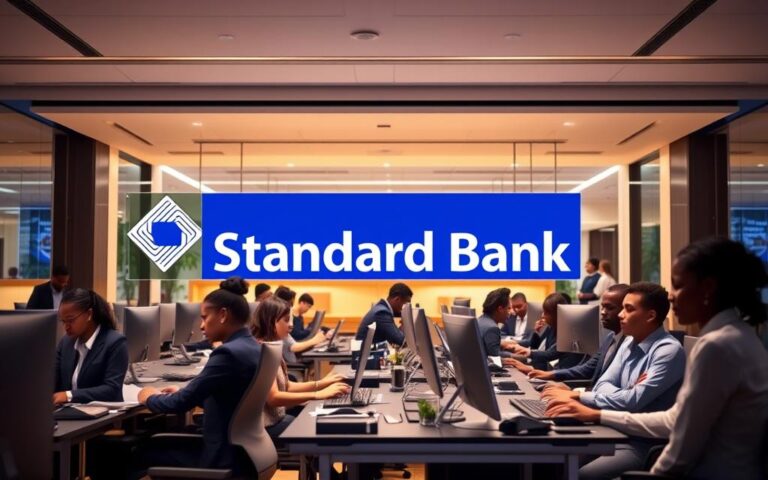Anúncios
Canada faces a critical shortage of skilled welders. By 2025, over 22,000 job openings are expected. This creates unprecedented opportunities for foreign workers in the thriving welding sector.
The Canadian welding industry offers remarkable prospects for international professionals. Skilled trade jobs provide competitive salaries and comprehensive benefits. They also offer clear paths to permanent residency through immigration programs.
Welding professionals worldwide can use various visa sponsorship options to enter Canada’s job market. The demand for specialized welding expertise spans multiple industries. These include construction, manufacturing, energy, and automotive sectors.
This guide will help you secure welding jobs in Canada as a foreign worker. You’ll learn about certification requirements and work permit processes. These insights will help launch your international welding career.
Canada’s robust trade sector offers exciting opportunities for skilled international workers. Experienced welders and emerging professionals can find meaningful employment here. The country provides long-term career growth for those seeking it.
Understanding Canada’s Welding Industry and Career Prospects
Canada’s welding industry offers exciting opportunities for skilled professionals. Foreign welders can find promising careers in a growing job market. Multiple sectors are seeking talented welders.

Canada’s industrial landscape generates high demand for skilled welders. The country’s economy relies on specialized trade professionals. These experts support critical industries across the nation.
Current Market Demand for Welders
Welding jobs in Canada are experiencing significant growth. Key economic regions show strong recruitment potential. Various sectors are actively seeking skilled welders.
- Oil and gas industry jobs require extensive welding expertise
- Construction jobs offer consistent employment opportunities
- Manufacturing and infrastructure development sectors actively recruit skilled welders
Average Salary and Benefits
Professional welders in Canada can expect competitive compensation packages. Annual earnings typically range between $50,000 and $90,000. Salaries vary based on specialization and experience.
Top Industries Hiring Foreign Welders
Canadian immigration programs support skilled welders seeking employment. Several industries prioritize foreign welding talent.
- Energy sector
- Construction and infrastructure
- Manufacturing
- Maritime and shipbuilding
“Skilled welders are essential to Canada’s economic growth and industrial development.” – Canadian Labor Association
Foreign welders with recognized certifications can find numerous opportunities. Proven expertise is highly valued in the Canadian job market. Skilled professionals are in demand across various industries.
Essential Requirements for Foreign Welders in Canada
Foreign welders must meet specific criteria to work in Canada. These requirements ensure skill competency and workplace readiness. Navigating this process is crucial for securing welding jobs in the country.
“Preparation is key to success in Canada’s competitive welding job market” – Canadian Welding Bureau
Welding certification is vital for foreign workers. Key requirements include recognized international credentials and 2-3 years of professional experience. Technical training from accredited institutions and proof of specialized skills are also necessary.
- Recognized international welding credentials
- Minimum of 2-3 years professional welding experience
- Technical training from accredited institutions
- Proof of specialized welding skills
Language skills are crucial in the temporary foreign worker program. Candidates need intermediate to advanced English or French proficiency. They must communicate technical instructions and pass standardized language tests.
- Intermediate to advanced English or French skills
- Ability to communicate technical welding instructions
- Successful completion of standardized language tests
Professional documentation is essential for foreign welders. They must prepare several important documents to support their application.
- Validated educational transcripts
- Comprehensive work experience certificates
- Technical skill assessment reports
- Valid international welding qualifications
Canadian employers value welders with diverse skills and clear communication. Understanding these requirements helps foreign professionals plan their Canadian welding career. This knowledge can lead to better opportunities in the field.
Welding Jobs in Canada for Foreign Workers
Canada’s industrial landscape offers exciting job opportunities for welders seeking international career growth. Foreign workers can explore skilled trade jobs across multiple provinces and territories. The welding profession presents unique pathways for international talent in a dynamic work environment.
Popular Welding Positions
Foreign workers can pursue multiple welding specializations in Canada’s job market:
- Structural Welder
- Pipeline Welder
- Fabrication Welder
- Aerospace Welder
- Marine Welder
Regional Job Opportunities
Work permits for foreign workers vary across Canadian regions. Key provinces with high demand include:
- Alberta: Oil and gas industry welding jobs
- British Columbia: Maritime and construction sectors
- Ontario: Manufacturing and automotive welding positions
- Saskatchewan: Heavy equipment and agricultural manufacturing
Employer-Sponsored Visa Programs
Canadian employers actively recruit skilled international welders through specialized immigration programs. These programs streamline work permits and provide clear pathways for career development.
“Canada’s welding industry values skilled international talent and offers competitive compensation packages for qualified professionals.” – Canadian Welding Bureau
Welders should research specific regional requirements to maximize their job opportunities. Maintaining updated certifications is crucial for success in Canada’s thriving skilled trades market.
Canadian Welding Certification and Documentation
Getting welding certification in Canada takes careful planning. Foreign welders need recognized credentials to prove their skills. These credentials are vital for job opportunities in Canada.
The Canadian Welding Bureau (CWB) is the main certification body for welders. It offers important training programs for foreign welders. These programs help welders start their careers in Canadian industries.
“Certification is not just a document, it’s your passport to professional success in Canada’s welding sector.”
Key certification requirements include:
- Completion of accredited welding training programs
- Passing practical and theoretical examinations
- Demonstrating proficiency in specific welding techniques
- Obtaining CWB National Certification
Canadian immigration for welders often favors those with recognized certifications. The process usually involves these steps:
- Skill assessment by authorized organizations
- Language proficiency testing
- Educational credential verification
- Professional certification validation
Pro Tip: Invest in upgrading your welding skills through Canadian training programs to enhance your immigration prospects.
Proper documentation is crucial for welding jobs. International welders need comprehensive portfolios. These should include educational transcripts, work experience certificates, and professional credentials.
Application Process and Visa Sponsorship Guidelines
The temporary foreign worker program for welding jobs in Canada requires careful preparation. Foreign welders must follow specific steps to secure work permits. This process is crucial for entering the Canadian labor market.
Canada offers multiple pathways for skilled welders seeking work opportunities. Understanding the requirements and documentation is essential. This knowledge ensures a smooth application process.
Work Permit Requirements
To obtain a work permit in Canada, welders must meet several key criteria:
- Possess a valid job offer from a Canadian employer
- Demonstrate professional welding certification
- Provide proof of relevant work experience
- Pass a medical examination
- Obtain a police background check
Immigration Pathways
Foreign welders can explore multiple immigration routes:
- Temporary Foreign Worker Program (TFWP)
- Provincial Nominee Program
- Express Entry system
- Skilled Worker Immigration
Documentation Checklist
Successful applicants must prepare the following documents:
- Valid passport
- Educational credentials
- Welding certifications
- Detailed employment history
- Proof of language proficiency
- Job offer letter
“Preparation is the key to successfully navigating Canadian immigration for welders.” – Canadian Immigration Expert
Each application needs careful attention to detail. Complete documentation is crucial. These steps boost approval chances through the temporary foreign worker program.
Conclusion
Welding jobs in Canada offer great chances for skilled foreign workers. The Canadian immigration system provides multiple paths for talented welders. These opportunities can lead to career growth in a strong job market.
Welders who meet certification requirements can unlock amazing career potential. Alberta, British Columbia, and Ontario have high demand for skilled welders. These opportunities span construction, manufacturing, and energy sectors.
Preparation is crucial when looking for skilled trade jobs in Canada. Research employer-sponsored visa programs and keep your certifications up-to-date. Build a strong portfolio of your work experiences.
Your journey to Canada as a welder needs dedication and thorough documentation. Stay proactive about your professional growth. Use the insights from this guide to achieve your career goals.
With the right approach, you can turn your welding skills into success. Canada’s welcoming workforce offers many chances for skilled foreign welders to thrive.
FAQ
What are the basic requirements for foreign welders to work in Canada?
Foreign welders need valid certifications and work experience. They must be proficient in English or French. A job offer from a Canadian employer is necessary. They’ll need a work permit through the Temporary Foreign Worker Program.
How can I find welding job opportunities in Canada?
Search online job boards like Indeed and Job Bank Canada. Network with Canadian welding companies and attend job fairs. Connect with recruitment agencies that specialize in skilled trades.
What certifications are recognized for welders in Canada?
Canada recognizes certifications from the Canadian Welding Bureau (CWB) and provincial trade certifications. International certifications like AWS are also accepted. You may need to have your existing certifications evaluated.
Which industries in Canada hire the most foreign welders?
Oil and gas, construction, manufacturing, and shipbuilding industries seek skilled welders. Infrastructure development also offers opportunities. Alberta, Saskatchewan, and British Columbia typically have the most welding jobs.
What is the average salary for welders in Canada?
Welders in Canada earn between CAD $45,000 and $90,000 annually. Salaries depend on experience, specialization, and location. Specialized welders in oil and gas can earn higher wages.
Do I need to speak French or English to work as a welder in Canada?
Yes, language skills are crucial. Most employers require basic English or French proficiency. For work permits and immigration, you’ll need to prove language skills through tests.
What visa options are available for foreign welders?
Options include the Temporary Foreign Worker Program and employer-specific work permits. Skilled worker immigration programs like Express Entry are also available. Some provinces have specific immigration streams for skilled trades.
How long does the process of getting a welding job in Canada typically take?
The process can take 3-12 months. Timing depends on job market conditions and your qualifications. Obtaining certifications, securing a job offer, and processing work permits also affect the timeline.
Are there any additional training requirements for welders in Canada?
Some employers require safety certifications like WHMIS. Trade-specific safety training may be necessary. You might need to upgrade your welding skills to meet Canadian standards.
Can foreign welders transition to permanent residency in Canada?
Yes, welders can often become permanent residents. Programs like Express Entry and Provincial Nominee Programs are available. The Canadian Experience Class is another option for those with skilled work experience.




